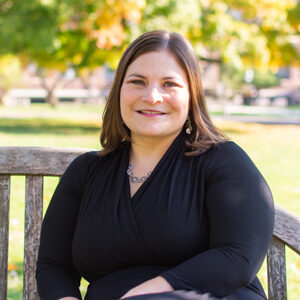 Kimberly Wagner is Assistant Professor of Preaching. Wagner previously served as an assistant professor of homiletics in the Axel Jacob and Gerda Maria (Swanson) Carlson Chair in Homiletics at the Lutheran School of Theology at Chicago. She earned her BS in Secondary Life Science Education from Miami University of Ohio, her MDiv from the Candler School of Theology, and her PhD from the Graduate Division of Religion, both at Emory University in Atlanta, GA. An ordained minister in the Presbyterian Church (USA), Wagner’s previous experience on the pastoral staff of a PC(USA) congregation in Virginia helps fuel and inform her present scholarship and teaching. She is passionate about supporting students’ formation and helping clergy and communities navigate the realities of an ever-changing world and church. Her current writing and work focus on preaching and ministry in the midst and wake of trauma, particularly thinking about collective trauma, the role of the preacher, and the resources of Scriptures and faith to respond to these moments. Wagner’s most recent book Fractured Ground expores this topic. When not teaching, writing, or meeting over Zoom, she enjoys baking, tinkering on the piano, and walks along the lake with her dog, Toby.
Kimberly Wagner is Assistant Professor of Preaching. Wagner previously served as an assistant professor of homiletics in the Axel Jacob and Gerda Maria (Swanson) Carlson Chair in Homiletics at the Lutheran School of Theology at Chicago. She earned her BS in Secondary Life Science Education from Miami University of Ohio, her MDiv from the Candler School of Theology, and her PhD from the Graduate Division of Religion, both at Emory University in Atlanta, GA. An ordained minister in the Presbyterian Church (USA), Wagner’s previous experience on the pastoral staff of a PC(USA) congregation in Virginia helps fuel and inform her present scholarship and teaching. She is passionate about supporting students’ formation and helping clergy and communities navigate the realities of an ever-changing world and church. Her current writing and work focus on preaching and ministry in the midst and wake of trauma, particularly thinking about collective trauma, the role of the preacher, and the resources of Scriptures and faith to respond to these moments. Wagner’s most recent book Fractured Ground expores this topic. When not teaching, writing, or meeting over Zoom, she enjoys baking, tinkering on the piano, and walks along the lake with her dog, Toby.
Opening Worship Preacher
Monday, May 13 1:30 p.m.
Seminary Chapel



